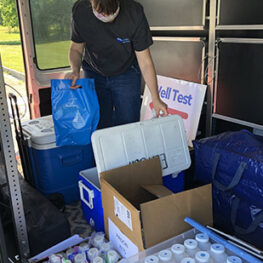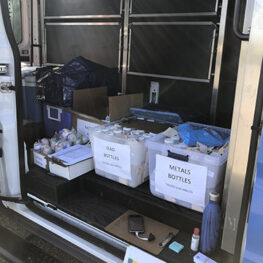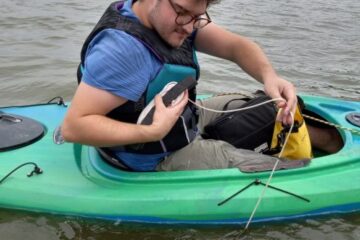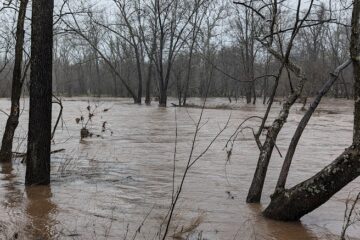 As the coronavirus pandemic continues to affect lives and daily routines, local watershed watchdog Raritan Headwaters Association (RHA) reminds homeowners with wells not to forget annual water quality testing.
As the coronavirus pandemic continues to affect lives and daily routines, local watershed watchdog Raritan Headwaters Association (RHA) reminds homeowners with wells not to forget annual water quality testing.
“The water you drink is vitally important to your health,” said Mara Tippett, RHA’s well testing manager. “We all want to know that the water coming out of our tap is safe for our families to drink.”
To make well testing more convenient for residents in the upper Raritan River watershed in Hunterdon, Somerset and Morris counties, RHA is holding a series of “Well Test Wednesdays” in local municipalities. Raritan Headwaters’ distinctive blue van will set up in local parking lots, allowing drive-through purchases of testing kits and drop-offs of water samples all on the same day.
The next two Well Test Wednesdays will be held on Wednesday, July 22, in Franklin Township (Hunterdon County) and on Wednesday, July 29, in Far Hills.
The Franklin Township event will be held in the parking lot of the municipal building at 202 Sidney Road in Pittstown on July 22. Residents can pick up a test kit with instructions between 8 and 10 a.m., go home and fill the sample bottles with water, then drop them off at the RHA van by 11 a.m.
The Far Hills event will be held in the municipal building parking lot at 6 Prospect Street on July 29. Test kits can be picked up between 8 and 10 a.m. Water samples may be dropped off at the Far Hills Borough Hall until 11 a.m. that day, or to the Raritan Headwaters office in Bedminster any Thursday morning before 10:30 am.
Earlier this summer, Well Test Wednesday events were held in Lebanon Township and Alexandria Township.
“It worked out very well, and people seemed appreciative that they still have the opportunity to test,” said Tippett. “We had a great turnout for both.”
During the Well Test Wednesdays, residents are asked to wear masks and stay in their cars. As they drive past the RHA van, Raritan Headwaters staff members wearing masks and gloves will greet them and answer their questions through the passenger side car windows. “We maintain social distancing and go by the latest public health guidelines,” Tippett said.
For more information about Well Test Wednesdays, visit the Raritan Headwaters website or contact Tippett at welltesting@raritanheadwaters.org.
Why Test Your Well?
“The only way to know if your water is safe to drink is by testing it,” said Tippett. “You can’t control everything in your life, but you can manage testing your well water to protect your family’s health.”
 Four out of five residents in the upper Raritan River watershed region – or about 200,000 people – get their drinking water from private wells.
Four out of five residents in the upper Raritan River watershed region – or about 200,000 people – get their drinking water from private wells.
Wells can become contaminated with a variety of pollutants, ranging from coliform bacteria from faulty septic systems, to nitrates from lawn and farm fertilizers, to naturally-occurring arsenic in the ground. In addition, lead from plumbing can contaminate water as it runs through pipes in the house.
While annual testing of public water systems is mandated, no such requirement exists for water from private wells. Testing of private wells is not required unless a property is being sold.
The most common well tests offered by Raritan Headwaters are for coliform bacteria and nitrates, but residents may also test for lead, arsenic, pesticides, radon, gross alpha (naturally-occurring radiation) and chromium. Testing is done by a certified laboratory that works with RHA, and results are available by email in about two weeks.
If contamination is found, RHA staff members can provide information on water treatment options, such as filter systems for the home.
Tippett noted that “free” water test kits found at big box stores are generally a sales tactic to sell expensive, often unnecessary, water softeners. The results obtained from that type of testing often do not provide homeowners with the information needed to determine the safety of their drinking water.
About Raritan Headwaters
A Bedminster-based nonprofit, Raritan Headwaters has been working since 1959 to protect, preserve and improve water quality and other natural resources of the Raritan River headwaters region through science, education, advocacy, land preservation and stewardship.
RHA’s 470-square-mile region provides clean drinking water to 300,000 residents of 38 municipalities in Somerset, Hunterdon and Morris counties and beyond to some 1.5 million homes and businesses in New Jersey’s densely populated urban areas.
To learn more about Raritan Headwaters and its programs, please visit www.raritanheadwaters.org or call 908-234-1852.



